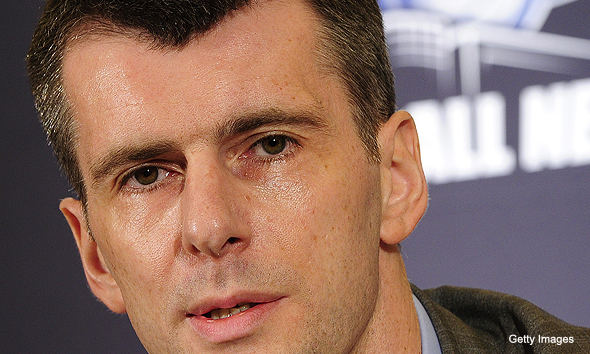
Is Moscow Preparing to Play the Ethnic Card to Stay Politically Relevant?
Publication: Eurasia Daily Monitor Volume: 9 Issue: 202
By:

At the convention of the new Russian political party Grazhdanskaya Platforma (Civil Platform) in Moscow on October 27, one of its leaders, billionaire-turned-politician Mikhail Prokhorov, proposed abolishing the republics within the Russian Federation. He advocated changing the Russian constitution to redraw its administrative borders in order to render all Russian regions more generic. According to Prokhorov, the present administrative division of the country led to the creation of “national ghettos” where corrupt officials were exploiting all Russian citizens regardless of their nationality. “Is it not better to say honestly that this Stalinist-Leninist system [of administrative division] is not effective anymore in the 21st century?” Prokhorov declared at the party convention. “Is it not better for us to discuss this question honestly and openly and set out to redraw the territory according to economic expediency? Yes, we will have to change the constitution; yes, radical changes of budgetary relations are needed to make municipal entities the primary actors” (https://ria.ru/parties/20121027/907211203.html).
Prokhorov’s controversial statement provoked a large response from the Russian public. Even Prokhorov’s own party colleague, ex-Finance Minister Alexei Kudrin, called the idea of abolishing the republics “disputable” (https://ria.ru/politics/20121027/907302109.html). The leaders of the republics were far blunter in condemning Prokhorov’s idea. “We have been through such calls—to level everything to the ground,” responded Mintimer Shaimiev, the ex-president of Tatarstan and still an influential politician, at a conference in Kazan, Tatarstan’s capital. Shaimiev condemned such calls as being against the constitution, unviable and unacceptable. He also criticized the Russian parliament’s law banning the use of the title “president” by the heads of the republics. The former president of Tatarstan called this move interference into the affairs of federation members. Shaimiev delivered his diatribe at a conference on the 20th anniversary of Tatarstan’s constitution and in the presence of several top Russian officials, as well as delegations from Turkmenistan, Kazakhstan, Kyrgyzstan and Russian regions (https://www.business-gazeta.ru/article/69387/). The president of Bashkortostan, Rustem Khamitov, offered “friendly advice” to Mikhail Prokhorov, telling him “not to touch inter-ethnic relations” (https://ria.ru/politics/20121030/907994224.html).
Politicians in the largest republic within Russia, Yakutia, also condemned Prokhorov’s remarks. In an online poll conducted by a Yakutian website, 27 percent of the respondents supported the idea of abolishing the republics within the Russian Federation, while 69 percent were against it and the remaining few percent of respondents were undecided (https://news.ykt.ru/article/6398). The results of a poll conducted by the Russian liberal radio station Ekho Moskvy were quite different. In the telephone survey, 64 percent of the callers approved of abolishing the republics while 36 percent were opposed (https://echo.msk.ru/polls/945231-echo/results.html). So, broadly speaking, ethnic Russians would probably support a decision by the Kremlin to disband the republics within Russia. Bashkir analyst Edvard Murzin told the Regnum news agency that Mikhail Prokhorov had in fact revealed the Kremlin’s actual plans. According to Murzin, Moscow is worried about the possible disintegration of the country if there is political unrest, oil prices fall or some other shock occurs. Therefore, eliminating the republics is seen by Moscow as a way of preventing ethnic mobilization and separatism (https://regnum.ru/news/1587549.html).
Prokhorov and his newly created party are indeed widely considered to be close to the Kremlin. The billionaire’s party-project is seen by Russian observers as part of the “managed opposition” that was created by Moscow to sideline the genuine opposition, which cannot be ordered around by the Kremlin (https://www.gazeta.ru/politics/2012/10/29_a_4828777.shtml). So Murzin may be quite right that Prokhorov said aloud something that some inside the Russian government are likely considering.
Although Moscow would potentially face serious risks if it decided to make good on the proposal to abolish the republics, it may still do so. There are several strong indicators suggesting this. The timing of Prokhorov’s statement on abolishing the republican status of some Russian territories coincided with the Russian opposition’s election of its Coordination Council. For the first time, the opposition managed to garner broader support from the Russian public and unite in a group of 30 people. The Coordination Council includes Alexei Navalny, Garry Kasparov, Boris Nemtsov, Andrei Illarionov, Andrei Piontkovsky and number of other leaders well known in Russia (https://cvk2012.org/news/rezultaty_golosovaniya/).
Prokhorov’s controversial statements may well have been designed by the Kremlin to fuel Russian nationalism and produce a kind of “rally ‘round the flag” effect among ethnic Russians. The purpose of the move was apparently to divert public opinion from the activities of the Russian opposition and those of the government, such as the crackdown on opposition figures. Thus, if Putin’s regime is pushed further by the growing opposition among Russians, the Kremlin may well choose to resort to more drastic measures, such as the actual abolishment of ethnic republics. Even if skirmishes ensue in the non-Russian areas of the country, the primary goal—winning the support of ethnic Russians—will have been achieved. This kind of thinking may well have found supporters in the Kremlin’s corridors, because the solution seems to be simple and workable. This would be a short-term solution, but in a critical situation, the regime might still revert to it as a means of self-preservation.
Moreover, Prokhorov and his scandalous statements may shed light on how and why ethnic conflicts developed in the Soviet Union before its ultimate demise. The attempt to use ethnic tensions for the purposes of improving the ruler’s political standing gives credence to claims that in the last years of the Soviet Union, Moscow purposefully and knowingly fueled ethnic conflicts, hoping to establish control over the leaders of the weakened periphery and their weary populations. It would not be surprising to find out that the modern Russian political establishment draws heavily on the Soviet experience in dealing with similar political challenges. With Putin’s regime evidently coming under increasing pressure, it may well revert to playing the ethnic card, like its Soviet predecessor. The results of such a decision, if it is taken, are extremely hard to predict both for Russia and its non-Russian regions.




